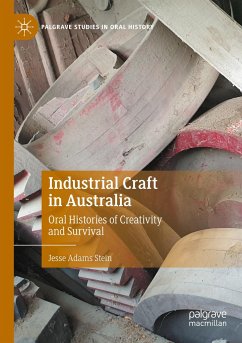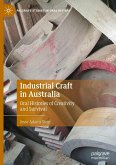This book is the first of its kind to investigate the ongoing significance of industrial craft in deindustrialising places such as Australia. Providing an alternative to the nostalgic trope of the redundant factory 'craftsman', this book introduces the intriguing and little-known trade of engineering patternmaking, where objects are brought to life through the handmade 'originals' required for mass production.
Drawing on oral histories collected by the author, this book highlights the experiences of industrial craftspeople in Australian manufacturing, as they navigate precarious employment, retraining, gendered career pathways, creative expression and technological change. The book argues that digital fabrication technologies may modify or transform industrial craft, but should not obliterate it. Industrial craft is about more than the rudimentary production of everyday objects: it is about human creativity, material knowledge and meaningful work, and it will be key to human survival in the troubled times ahead.
Drawing on oral histories collected by the author, this book highlights the experiences of industrial craftspeople in Australian manufacturing, as they navigate precarious employment, retraining, gendered career pathways, creative expression and technological change. The book argues that digital fabrication technologies may modify or transform industrial craft, but should not obliterate it. Industrial craft is about more than the rudimentary production of everyday objects: it is about human creativity, material knowledge and meaningful work, and it will be key to human survival in the troubled times ahead.
"Stein offers distinctive insights into the political and creative economies of manufacturing technologies and the continued-though contested-role of industrial craftworkers within them. Though deeply rooted in the personal histories of Australian patternmakers, the book will be useful for scholars of craft, industrial labor, and manufacturing technologies across a range of global contexts and trades." (Amanda Lanzillo, Technology and Culture, Vol. 64 (3), July, 2023)
"Jesse Adams Stein's important book explores the little-known world of engineering patternmaking, situates it within the context of long-term industrial decay, challenges common assumptions about the causes of that decline, and makes suggestions about what might reverse it. ... the book's photographs suggest, many of the patterns shaped by these craftspeople are incredibly beautiful. ... This tightly argued, incredibly rich text should be read not just by labour scholars and activists, but also by progressivepoliticians and citizens." (John Tully, Labour-Le Travail, Vol. 90, 2022)
"Jesse Adams Stein's important book explores the little-known world of engineering patternmaking, situates it within the context of long-term industrial decay, challenges common assumptions about the causes of that decline, and makes suggestions about what might reverse it. ... the book's photographs suggest, many of the patterns shaped by these craftspeople are incredibly beautiful. ... This tightly argued, incredibly rich text should be read not just by labour scholars and activists, but also by progressivepoliticians and citizens." (John Tully, Labour-Le Travail, Vol. 90, 2022)








